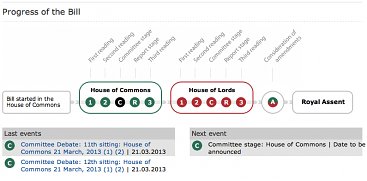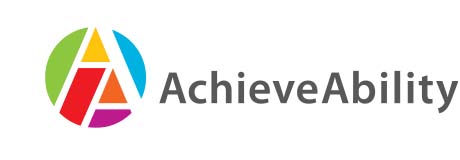Children and Families Bill
Summary of the Children and Families Bill 2012-13
The Bill seeks to reform legislation relating to the following areas:
- adoption and children in care
- aspects of the family justice system
- children and young people with special educational needs
- the Office of the Children's Commissioner for England
- statutory rights to leave and pay for parents and adopters
- time off work for ante-natal care
- the right to request flexible working.
The Bill seeks to reform legislation relating to the following areas:
- adoption and children in care
- aspects of the family justice system
- children and young people with special educational needs
- the Office of the Children's Commissioner for England
- statutory rights to leave and pay for parents and adopters
- time off work for ante-natal care
- the right to request flexible working.

AchieveAbility would like to respond to the provision for children and young people with special educational needs.
The provision is to be available for 0- 25 years. AchieveAbility is particularly pleased to see that the age range has now been extended to include up to 25 years and that parents and families will be critical to how the EHCP is delivered. Importantly it is now proposed that a person other than a parent/carer can now request assessment for a young person.
However, many young people who have a specific learning difference (SpLD), who are not in employment, education or training (NEETS) might not be aware or know how to access this provision.
AchieveAbility is particularly concerned about Post 16 young people and those young people who might be hardest to reach. How those young people who are not within the mainstream (education/ training/ employment) would access an assessment to then access the local offer.
The provision is to be available for 0- 25 years. AchieveAbility is particularly pleased to see that the age range has now been extended to include up to 25 years and that parents and families will be critical to how the EHCP is delivered. Importantly it is now proposed that a person other than a parent/carer can now request assessment for a young person.
However, many young people who have a specific learning difference (SpLD), who are not in employment, education or training (NEETS) might not be aware or know how to access this provision.
AchieveAbility is particularly concerned about Post 16 young people and those young people who might be hardest to reach. How those young people who are not within the mainstream (education/ training/ employment) would access an assessment to then access the local offer.
AchieveAbility position statement on the Children and Families Bill
Introduction to AchieveAbility
AchieveAbility is a Social Enterprise Not for Profit Company. AchieveAbility started life as an AimHigher National Project based at the University of Westminster as from 2004-6. Now no longer based at the University of Westminster the Network continues to collaborate with Westminster through the National Network for Languages London. AchieveAbility exists to promote accessible education, training and employment opportunities for people who experience Dyslexia. We enable people to reach their potential.
Vision:
To work towards a society that positively recognises the strengths of Dyslexic people to achieve of their full potential and ability within education, training and employment.
Aim:
To plan and deliver accessible and inclusive education and training within the London and wider community in partnership with other like minded organisations.
To provide opportunity for workplace learning and skills development
Specific Objectives:
To unlock the potential of those with dyslexia
To recognize the strengths of those with dyslexia
To support the adult dyslexic people in the workplace
To enhance skills and organizational capacity by developing internships
AchieveAbility is committed to sharing and disseminating good practice, resources and information to bring value to the learning environment and wider community.
AchieveAbility initiates and participates in discussion, research and develops projects to mainstream equality and access related to the educational involvement of all learners.
Briefing on the Children and Families Bill Second Reading
AchieveAbility supports the briefing from the Dyslexia-SpLD Trust. AchieveAbility would like to make the following submission in the areas of its expertise, including post 16 transition and offender learning.
AchieveAbility welcomes the Bill's approach to placing children and young people and families at the centre of decision-making.
We welcome the breadth of vision in Clause 21 whereby it is recognised that the support needed by young people should be focussed on transition to adult life, for example a specialist job coach.
Clause 22 Identifying children and young people with special educational needs.
AchieveAbility would like to highlight the need not only to identify the needs of children with dyslexia and Specific Learning Difficulties (SpLD) early, but also to identify these through secondary education and post 16 learning. We are still hearing reports from FE colleges and Universities that students are being identified after enrolment, because secondary schools have failed to take their learning difficulties seriously. In some cases it seems that this may be to save money on assessment at, say 14, when the cost can be loaded onto FE at 16. The all age vision of the Bill is welcomed and must ensure that young people with SpLD are not sidelined in the important 14-16 years by concerns about resources and league tables.
Review of education and care provision
Clause 27 Duty to keep education and care provision under review
We understand it is the aim of the legislation to smooth out the transition process and it is important that Local Authorities recognise the significance of age appropriate provision for young people and adults with SpLD up to age 25 in undertaking reviews. The suggested requirement to consult young people is welcome as their experience and aspirations must be heard in order to identify if provision is sufficient.
Information and advice
Clause 30 Local offer for children and young people
AchieveAbility welcomes the local offer, but has concerns that the provision of independent advice and guidance is not part of this offer. It is essential that young people receive this free of conflicts of interest of 6th form headcounts, the cost of support, geographic limitations wrongly imposed by local authorities, and transport provision. The regulations need to include specific guidance, with examples of what is an acceptable standard of local offer. Whilst local, the offer needs to reflect the aspirations to further and higher educations of young people with SpLD, regardless of where they live.
Clause 32 Advice and information for parents and young people
The inclusion of young people in the reach is welcome, and links with our comments above on the independence of those providing the advice. The well documented barriers to transition from 14-19 and 19+ must be removed through these actions, and regulations need indicate this and again show examples of good practice.
Assessment
Clause 36.AchieveAbility welcomes the opportunity for young people to request an assessment. It is particularly important that young people with SpLD receive an updated diagnostic assessment of their needs to inform further and higher education providers of their learning needs in higher level learning. The regulations need to include a 16+ assessment for all young people with SpLD as part of their transition from school. This links to Clause 44 reviews and re-assessments
Appeals, mediation and dispute resolution
AchieveAbility welcomes the transfer of the right of appeal to a First-tier Tribunal. Young people are not only learning and developing academically, they are also working towards independence and managing their own impairment or SpLD. We also welcome the provision of mediation, so many barriers put up for young people with SpLD are because of misunderstanding of the nature of dyslexia and other specific learning difficulties and lack of experience of meeting and working with these young people. We also welcome the changes to the Equality Act 2010 in Clause 55 to enable young people to make disability discrimination claims themselves to a First-tier Tribunal.
Special educational provision: functions of governing bodies and others
Clause 62. AchieveAbility has identified the need for SEN Co-ordinators to have a statutory requirement to receive training on teaching and learning related to dyslexia and SpLD.
AchieveAbility Barbara Waters 10/03/2013
